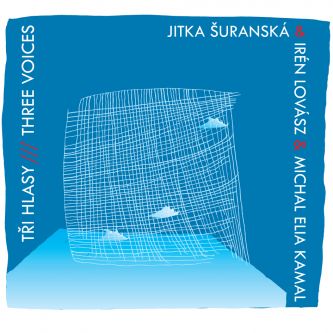
| CD | $ 11.36 |
| MP3 | $ 4.42 |
| FLAC+mp3 | $ 6.66 |
| WAV+mp3 | $ 8.89 |
Folk Album ‘Tři Hlasy’ (Three Voices) reviewed by Ian Mole





October 30, 2015

Tři hlasy – Three Voices
This live album was recorded at a folklore festival in Náměšti nad Oslavou in the Czech Republic in early August 2014 and the three voices of the title belong to Irén Lovász from Hungary, Michal Elia Kamal (from Iran with a Jewish background) and Jitka Šuranská from the Czech Republic, whose idea it was to put the band together. There’s a wide range of influences to be heard here, and instruments too: accordion, violin, kytara guitar, mandolin and santur (a hammered dulcimer from Iran), to name just a few of them.
There are nine tracks beginning with Tři hlasy (‘Three Voices’) a short acapella song featuring all three voices in turn that displays the power and range of each. This is followed by a slow tempo Hungarian song Csak azt szánom bánom with Iren on lead vocals accompanied by the band and featuring emotive violin and mandolin solos.
The next track Bursa’nin Ufak Tefek Taslari is an upbeat Light in Babylon song with the dulcimer to the fore featuring the three voices singing in harmony. Another up-tempo song is Hej, Jancsika Jancsika, again from Hungary, that has Iren starting the vocals before the two others join in. The violin is prominent again and there’s a nice mandolin solo and the catchiest chorus of all. Secharchoret, which is a Light in Babylon song from their album ‘Istanbul’, has a solo and at times very guttural vocal from Michal accompanied by guitar and mandolin.
The concert climaxes with the longest track, a nine-minute version of the well-known song Hava Nagila, featuring a lead vocal from Michal who’s later joined by the two others, and it allows the accordion, violin and dulcimer solos to stretch out impressively. This is followed by an encore Za vodu (‘For Water’), a Jitka song with the three voices harmonizing well and with the violins again powering things along.

Jitka Šuranská
Does it matter that the songs are in so many languages that virtually nobody will be able to understand all of them? No, says singer Jitka Šuranská: ‘the themes in the songs were not the main motivation for the project. When I met with the other girls – Michel and Iren – we just started to sing songs that we loved, and the repertoire developed naturally. My songs are about love – all of them, and I think it’s the same for the other two… Music is an exchange of emotion. We didn’t need any translations to understand each other.’
Judging from the warm applause, the live audience obviously agreed with Jitka. The whole ensemble only got together two days before the concert but despite the lack of practice time, this album bursts with life and demonstrates that folk music doesn’t belong in a museum.